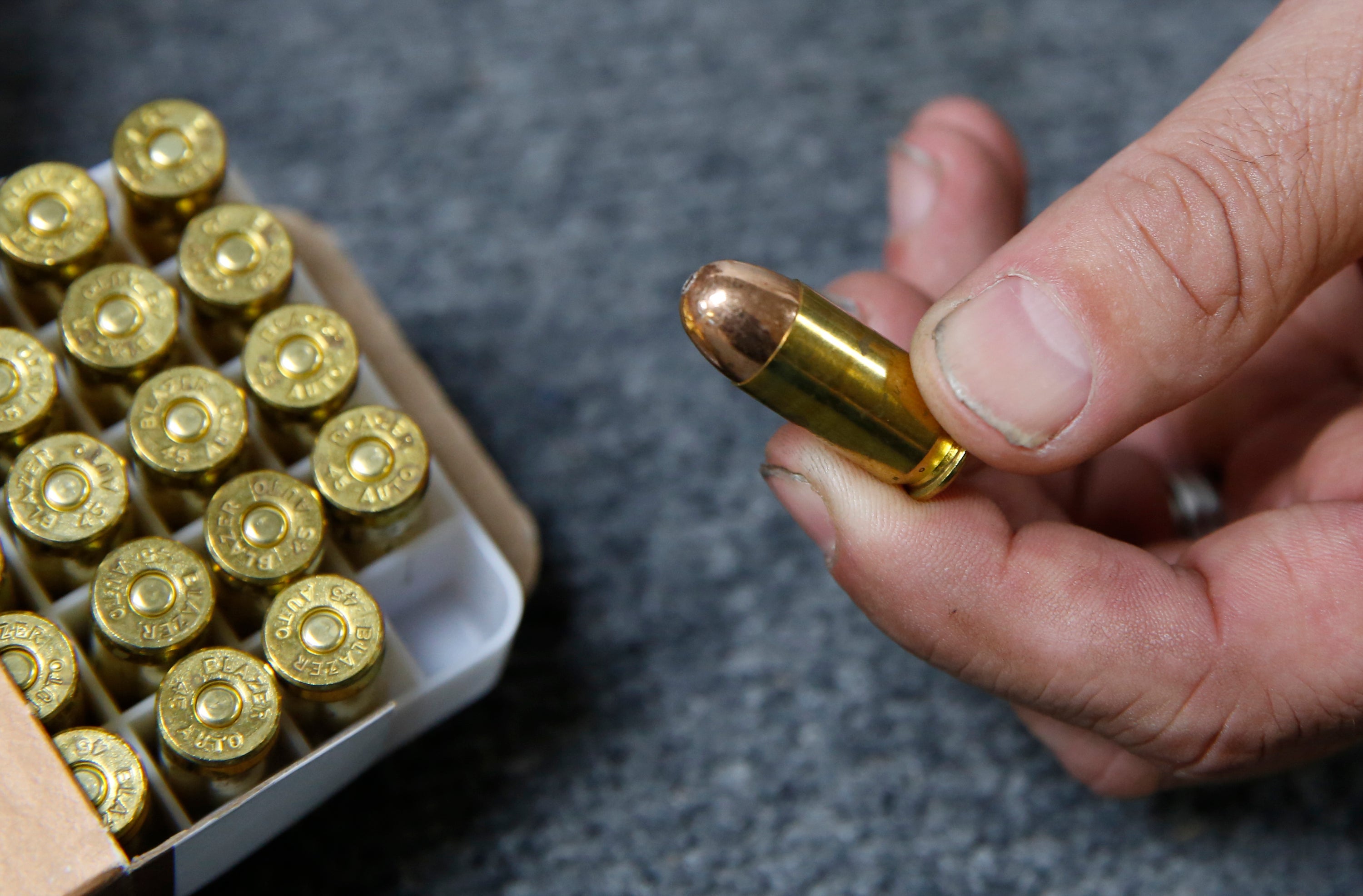California bill aims to jumpstart 'microstamps' on handguns
California could expand its unique law requiring individual identifiers on all bullet casings to include weapons used by law enforcement

Your support helps us to tell the story
From reproductive rights to climate change to Big Tech, The Independent is on the ground when the story is developing. Whether it's investigating the financials of Elon Musk's pro-Trump PAC or producing our latest documentary, 'The A Word', which shines a light on the American women fighting for reproductive rights, we know how important it is to parse out the facts from the messaging.
At such a critical moment in US history, we need reporters on the ground. Your donation allows us to keep sending journalists to speak to both sides of the story.
The Independent is trusted by Americans across the entire political spectrum. And unlike many other quality news outlets, we choose not to lock Americans out of our reporting and analysis with paywalls. We believe quality journalism should be available to everyone, paid for by those who can afford it.
Your support makes all the difference.Gun control advocates are making a new attempt to force the gun industry to comply with California s unique law requiring individual identifiers on all bullet casings, a mandate that has been toothless since it was approved in 2007.
The law requires gun manufacturers to adopt micro-stamping technology on new types of handguns introduced in California.
The intent was to imprint a unique set of microscopic characters on all cartridge casings when weapons are fired, linking bullet casings to the guns that discharged them.
Gun makers have said the technology is unreliable and to get around the law have not introduced new gun models in the state since the law was passed.
New legislation would expand the law to include weapons used by law enforcement, which are currently exempt. The thinking is that forcing police officers into the marketplace would prompt manufacturers to improve technology so they can sell the weapons to members of law enforcement.
The bill by Democratic Assemblyman Jesse Gabriel, co-founder of the Legislature’s Gun Violence Prevention Working Group, would add law enforcement starting in 2023.
“The main priority here is to really overcome the obstinance from gun manufacturers,” Gabriel told The Associated Press. ”They’ve resisted at every step of the way.”
Mark Oliva, spokesman for the National Shooting Sports Foundation that is the trade association for the firearm industry, said microstamping is an “ unworkable technology."
It could take up to 10 bullet casings to piece together one complete digital identifier that could determine the weapon that fired the bullets, he said.
“It sounds great on paper but ... it doesn't hold up. All it does is infringe on the rights of law-abiding citizens and make firearms unavailable to them,” Oliva said.
Moreover, he said, the technology could be easily defeated by sanding the microstamp off the firing pin in much the same way that criminals currently erase guns' serial numbers.
As a result, Oliva said, “I don't see how this would to help to solve crime or resolve criminal misuse of firearms.”
The microstamps also would eventually wear off of the firing pins, Oliva said, because law enforcement officers may fire thousands of rounds with their service weapons in training alone.
Last year, California enacted a law easing the requirement for two microstamps on each shell casing to one, with proponents citing legal filings in which the industry said it could meet that standard. Another bill this year would keep the two-stamp requirement in place until July 2022.
The Educational Fund to Stop Gun Violence, which is affiliated with the Coalition to Stop Gun Violence, last month released a report touting the technology’s potential to link cartridge casings recovered at crime scenes to specific firearms without having to recover the firearm itself.
But gunowners' rights groups are challenging the California law before the same federal judge who has already rejected the state's ban on ammunition magazines holding more than 10 bullets and its law requiring background checks to buy ammunition, decisions that the state is appealing to the 9th U.S. Circuit Court of Appeals. U.S. District Judge Roger Benitez in San Diego is also considering throwing out the state's ban on assault weapons.
Aside from the microstamping requirement, the groups object to a provision of the law that would require the state to remove three models of handguns from its approved list for every new model allowed to be sold in California starting July 1, 2022. That will continue to choke off consumers' choice in violation of gun owners' constitutional rights, the suit contends.
Firearms Policy Coalition president Brandon Combs, one of the plaintiffs, said “we see no chance that law enforcement will allow the government to make them follow the same rules that citizens must."
No other U.S. state has either the microstamping law nor the law enforcement requirement, but Gabriel said the most-populous state’s requiring technology for law enforcement should change that.
“We’re going to create a market for microstamp guns. There are 86,000 active law enforcement officers in the state of California. Folks are going to want to sell to them, want to be able to compete in that market,” Gabriel said. “This is technology that benefits law enforcement, that is going to help them in their investigations."
And at a time when shootings by police are under a new level of scrutiny, gun violence prevention advocates the Brady Campaign and its youth affiliate Team ENOUGH said the microstamps would help with investigations and provide additional transparency anytime officers fires their weapons.
Associations representing sheriffs, police chiefs and rank-and-file officers said they were reviewing the proposed legislation.